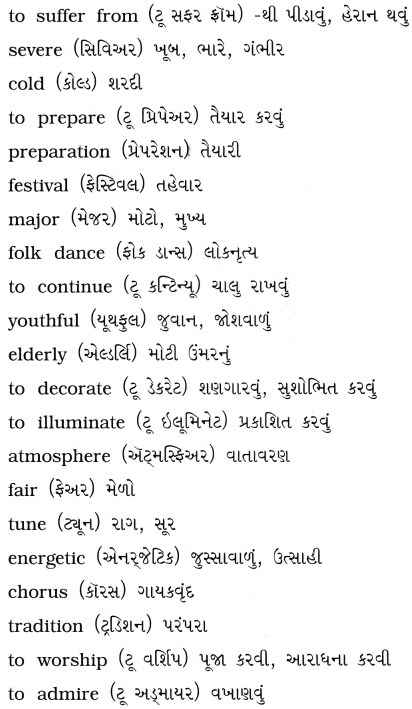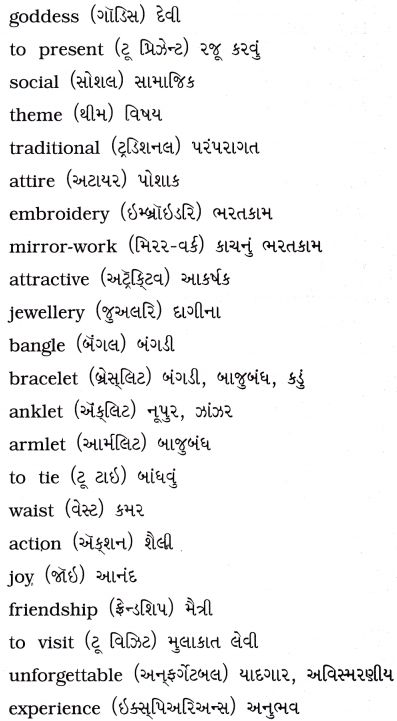Gujarat Board GSEB Solutions Class 7 English Second Language Sem 2 Unit 4 Q of Yesnoyesnoyesno Textbook Exercise Questions and Answers.
GSEB Std 7 English Textbook Solutions Sem 2 Unit 4 Q of Yesnoyesnoyesno
GSEB Class 7 English Q of Yesnoyesnoyesno Text Book Questions and Answers
Activity 1.
Read and enjoy.
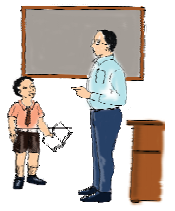
Parth : Sir, will you punish me for what I did not do?
(સર, વિલ યુ પનિશ મી ફૉર વૉટ આઈ ડિડ નૉટ ડૂ?) સાહેબ, શું તમે મને જે ન કર્યું હોય તેની સજા આપશો?
Teacher : No, of course not.
(નો, ઑવ કૉર્સ નૉટ.) ના, બિલકુલ નહીં.
Parth: I have not done my homework today.
(આઈ હેવ નૉટ ડન માઇ હોમવર્ક ટૂડે.) આજે મેં મારું ઘરકામ કર્યું નથી.
![]()
Question 1.
Did Parth do his homework ?
Answer:
No, Parth did not do his homework.
Question 2.
Will the teacher punish Parth ?
Answer:
Yes, the teacher will punish Parth.
Question 3.
The teacher will punish Parth because
Answer:
The teacher will punish Parth because he has not done his homework.
(2)

Tushar : Jigar, your father was black a few months ago. But now he is looking very fair.
(જિગર, યુઅર ફાધર વૉઝ બ્લેક અ ફ્યુ મર્સ અગો. બટ નાઉ હી ઇઝ લુકિંગ વેરિ ફેઅર.) જિગર, થોડા મહિના પહેલાં, તારા પિતા કાળા હતા. પણ હવે તેઓ ખૂબ ગોરા દેખાય છે.
Jigar : Yes, you are right.
(યસ, યુ આર રાઇટ.) હા, તારી વાત સાચી છે.
Tushar : Does he apply fairness cream?
(ડઝ હી અપ્લાઈ ફેઅરનિસ ક્રીમ?) શું તેઓ ગોરા થવાનું ક્રીમ (લેપ) લગાડે છે?
Jigar : No, he doesn’t.
(નો, હી ડઝન્ટ.) ના, તેઓ (લગાડતા) નથી.
Tushar : Did he consult a beautician?
(ડિડ હી કન્સલ્ટ અ બ્યુટિશન?) શું તેમણે કોઈ સૌંદર્ય-તજજ્ઞની સલાહ લીધી?
Jigar : See, before two months, he was working in an oil mill and now he is working in a flour mill.
(સી, બિફૉર ટૂ મળ્યુસ, હી વૉઝ વર્કિંગ ઇન ઍન ઑઇલ મિલ ઍન્ડ નાઉ હી ઇઝ વર્કિંગ ઇન એ ફ્લાઉઅર મિલ.) જો, બે મહિના પહેલાં, તેઓ તેલની મિલમાં કામ કરતા હતા અને હવે તેઓ આટા મિલમાં કામ કરે છે.
![]()
Question 1.
Did Jigar’s father apply a face cream ?
Answer:
No, Jigar’s father did not apply a face cream.
Question 2.
Did Jigar’s father consult a beautician ?
Answer:
No, Jigar’s father did not consult a beautician.
Question 3.
Did Jigar’s father work in a coal mine ?
Answer:
No, Jigar’s father did not work in a coal mine.
(3)

Teacher : Why are you late today?
(વાઈ આર યૂ લેટ ટુડે?) આજે તું મોડો કેમ (આવ્યો) છે?
Chintu : Sir, I got up a bit late today. I
was in a hurry. I pressed the toothpaste very hard, and the whole paste came out. I tried very hard to put the paste back into the tube. I tried for more than an hour. But I failed. Then I started for school. So I reached late.
(સર, આઈ ગૉટ અપ અ બિટ લેટ ટૂડે. આઈ વૉઝ ઈન અ હરિ. આઈ પ્રેસ્ડ ધ ટુથપેસ્ટ વેરિ હાર્ડ, ઍન્ડ ધ હોલ પેસ્ટ કેમ આઉટ. આઈ ટ્રાઇડ વેરિ હાર્ડ ટૂ પુટ ધ પેસ્ટ બૅક ઇન્દુ ધ ટ્યૂબ. આઈ ટ્રાઇડ ફૉર મૉર ધંન ઍન આવર. બટ આઈ ફેલ્ડ. ધેન આઈ સ્ટાર્ટિડ ફૉર સ્કૂલ. સો આઈ રીડ લેટ.)
સાહેબ, આજે હું થોડો મોડો ઊડ્યો. ઉતાવળમાં હતો. મેં ટુથપેસ્ટ ખૂબ જોરથી દબાવી, અને બધું જ પેસ્ટ બહાર આવી ગયું. મેં પેસ્ટ ટ્યૂબમાં પાછી નાખવાનો ખૂબ પ્રયત્ન કર્યો. મેં એક કલાકથી પણ વધુ પ્રયત્ન કર્યો. પણ હું નિષ્ફળ રહ્યો. પછી હું શાળાએ આવવા નીકળ્યો. તેથી હું મોડો પહોંચ્યો.
![]()
Question 1.
Did Chintu get up on time ?
Answer:
No, Chintu did not get up on time.
Question 2.
Did Chintu try to put the paste back into the tube? Did he succeed?
Answer:
Yes, Chintu tried to put the paste back into the tube. He did not succeed.
Question 3.
Did Chintu reach the school on time ?
Answer:
No, Chintu did not reach the school on time.
(4) Fatimabibi wanted to get rid of an old cat. She asked her husband Mulla Nasruddin to take the cat to a nearby forest and leave her there. After a few days, Mulla was narrating this incident to his friend, Sirajuddin.
(ફાતિમાબિબિ વૉન્ટિડ ટુ ગેટ રિડ ઑવ ઍન ઓલ્ડ કૅટ. શી આડ હર હઝબન્ડ મુલ્લા નસરુદ્દીન ટૂ ટેક ધ કૅટ ટુ અ નિઅરબાઈ ફૉરિસ્ટ ઍન્ડ લીવ હર ધેઅર. આફ્ટર અ ફ્સ ડેઝ, મુલ્લા વૉઝ નરેટિંગ ધિસ ઇન્સિડન્ટ ટૂ હિઝ ફ્રેન્ડ, | સિરાજુદ્દીને.) ફાતિમાબિબિને એક ઘરડી બિલાડીથી છુટકારો મેળવવો હતો. તેમણે તેમના પતિ, મુલ્લા નસરુદ્દીનને બિલાડી નજીકના જંગલમાં લઈ જઈને ત્યાં છોડી આવવા કહ્યું. થોડા દિવસ પછી મુલ્લા આ ઘટના તેમના મિત્ર સિરાજુદ્દીનને કહી રહ્યા હતા.
Mulla: I put the cat into the basket, walked through unknown streets, reached the forest. I took many trails turning round and round and reached a dense grove. Then I opened the basket and the cat jumped out.
(આઈ પુટ ધ કૅટ ઇન્દુ ધ બસ્કિટ, વૉડ યૂ અનોન સ્ટ્રીટ્સ, રીડ ધ ફૉરિસ્ટ, આઈ ટુક મેનિ સૅલ્ક ટર્નિગ રાઉન્ડ ઍન્ડ રાઉન્ડ ઍન્ડ રીડ અ ડેન્સ ગ્રોવ. ધેન આઈ ઓપન્ડ ધ બસ્કિટ ઍન્ડ ધ કૅટ જમ્પડ આઉટ.) મેં બિલાડીને એક ટોપલીમાં મૂકી, અજાણી શેરીઓમાંથી પસાર થઈ, (હું) જંગલમાં પહોંચ્યો. ગોળ ગોળ ફરતી ઘણી પગદંડીઓ પર ચાલીને હું એક ગાઢ ઉપવનમાં પહોંચ્યો. પછી મેં ટોપલી ખોલી અને બિલાડી બહાર કૂદી પડી.
Siraj : So, finally you got rid of the cat. Did Fatima thank you?
(સો, ફાઈનલિ યૂ ગૉટ રિડ ઑવ ધ કૈંટ. ડિડ ફાતિમાં થેંક યૂ?) એટલે (ક) અંતે તમે બિલાડીથી છુટકારો મેળવ્યો. શું ફાતિમાએ તમારો આભાર માન્યો?
Mulla : No, Fatima thanked the cat.
(નો, ફાતિમા છૅડ ધ કૅટ.) ના, ફાતિમાએ બિલાડીનો આભાર માન્યો.
Siraj : Why so?
(વાઈ સો?) શા માટે?
Mulla :I came back home because of the cat. I followed her.
(આઈ કેમ બૅક હોમ બિકૉઝ ઑવ ધ કેટ. આઈ ફૉલોડ હર.) હું બિલાડીને લીધે ઘરે પાછો આવ્યો. હું તેની પાછળ પાછળ આવ્યો.
![]()
Question 1.
Did Fatimabibi like the cat ?
Answer:
No, Fatimabibi did not like the cat.
Question 2.
Did Mulla get rid of the cat ?
Answer:
Yes, Mulla got rid of the cat.
Question 3.
Did Mulla forget the way to his home ?
Answer:
Yes, Mulla forgot the way to his home.
Activity 2.
Play the game ‘DOLLY’. Your teacher will help you.
સૌપ્રથમ Student A કોઈ પણ fruit, game, bird, animal કે cityનું નામ ધારશે અને નીચેનામાંથી કોઈ પણ એક વાક્ય બોલશે.
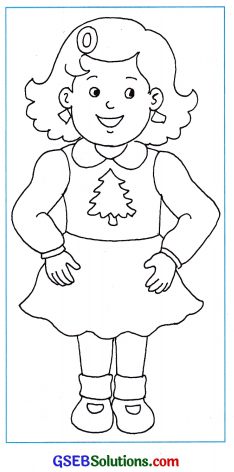
E.g
I ate some fruit. OR I will eat some fruit.
I played some game. OR I will play some game.
I saw some bird. OR I will see some bird.
I saw some animal. OR I will see some animal.
I saw some vehicle. OR I will see some vehicle.
હવે, Student B-Student Aને નીચે મુજબના પ્રશ્નો પૂછશે અને સાચો ઉત્તર મેળવવાનો પ્રયત્ન કરશે. આકૃતિમાં બતાવ્યા પ્રમાણે 6 stepsમાં Dollyની આકૃતિ રચાશે.
![]()
E.g.
Did you eat an apple? OR Will you eat an apple?
Did you play cricket? OR Will you play cricket?
Did you see a sparrow? OR Will you see a sparrow?
Did you see a dog? OR Will you see a dog?
જેમ જેમ પ્રશ્નો પુછાતા જશે તેમ તેમ Dollyની આકૃતિ રચાતી જશે. Student B-student Aને વધુમાં વધુ 6 પ્રશ્નો પૂછી શકશે. આકૃતિમાં બતાવ્યા પ્રમાણે 6 stepsમાં Dollyની આકૃતિ રચાશે.
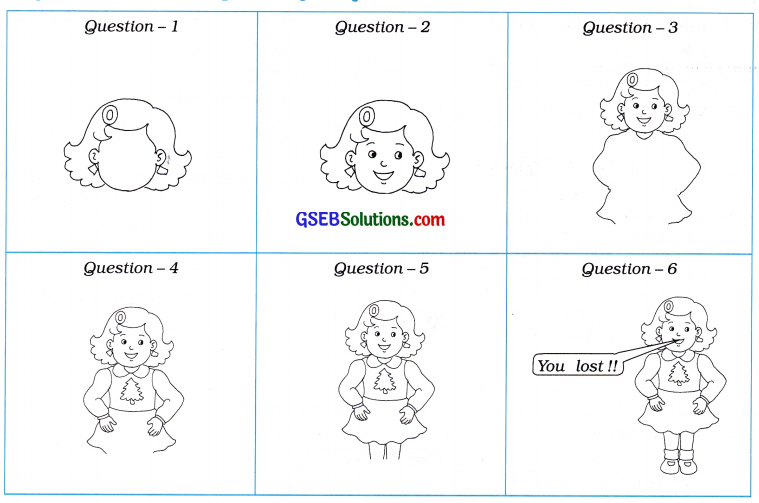
Demo -1:

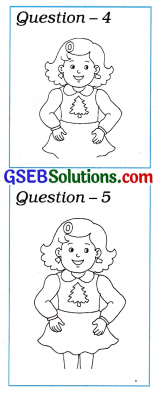
Kamil: I ate some fruit.
Sanjana : Did you eat a banana?
Kamil: No, I didn’t.
Saryana : Did you eat an apple ?
Kamil: No, I didn’t.
Sanjana : Did you eat an orange?
Kamil: No, I didn’t.
Sanjana : Did you eat a watermelon?
Kamil : No. I didn’t
Sanjarta : Did you eat grapes?
Kamil: Yes. I did.
![]()
Demo – 2:

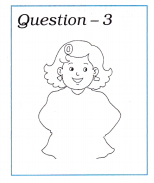
Anant: I will go to some city.
Rutal: Will you go to Ahmadabad ?
Anant: No, I won’t.
Rutal: Will you go to Surat?
Anant: No, I won’t.
Rutal: Will you go to Gandhinagar?
Anant: Yes, I will.
અહી Rutal એ ફક્ત ૩ જ પ્રશ્નોમાં સાચો ઉત્તર શોધી કાઢ્યો, તેથી તેને ૩ points મળશે. અને Anant પોતે Dolly બનશે !!!, તે હારી જશે અને Rutal જીતી જશે.
Activity 3.
(A) Read the dialogue.
Moin Khan is a soldier in the Indian Army. He was at the Kargil border. He is an Infantry Officer. Today he is in Gyanswami Primary School, Khandhali. The students are asking some questions to Moin Khan.
Harsh: Hello, sir. We are very happy that you are with us. We want to know many things from you.
Moin Khan: Hello, students. You can ask questions one by one.
Harsh: Sir, do you have a very busy schedule ?
Moin Khan : Our day starts at 4:30 in the morning. We have to get ready for march by 5:00. Then we do some exercises. Sometimes, we go for hill-climbing, too.
Hitesh:Oh! Really, a busy morning! Sir, you must be hungry after a lot of exercise. Do you eat breakfast after exercise ?
![]()
Moin Khan: Yes, we go for breakfast. After breakfast, we practise firing.
Aayushi: Sir, I saw a tank in a movie.
But I didn’t find the driver in the tank. Does the tank run by itself ?
Moin Khan: No, dear. It doesn’t run by itself. There is a driver in the tank.
Anant: Sir, do you drive a tank ?
Moin Khan: No, I don’t. There are some other soldiers for that. I can’t drive a tank because I am an Infantry Officer.
Oshin : Sir, what is an infantry ?
Moin Khan: Infantry is a kind of army unit. It fights on foot. We are foot-soldiers. We fight enemies face-to-face.
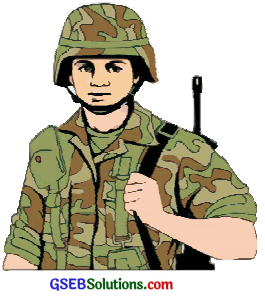
(ઇન્ફન્ટ્રિ ઇઝ અ કાઇન્ડ ઑવ આર્મિ યુનિટ. ઇટ ફાઇટ્સ
ઑન ફુટ. વી આર ફુટ-સોલ્જર્ઝ. વી ફાઇટ એનમિઝ ફેસટુ-ફેસ.) ઇન્ફન્ટ્રિ (પાયદળ) એ સેનાનો એક પ્રકારનો એકમ છે. તે પગે ચાલીને) લડે છે. અમે પાયદળ છીએ. અમે શત્રુ સાથે સામસામે લડીએ.
Mit: So do you carry weapons with you ?
Moin Khan : Yes, we have to carry weapons with us. We use firearms such as rifle, pistol, machine-gun and knife. We have to carry 50 kg of load with us.
Nirmal: Sir, do you have your family ?
Moin Khan: Yes, I have. My wife’s name is Sabira. I have two children. Their names are Afzal and Arfeen.
Janvi: Does your wife come to meet you there ?
Moin Khan: No, she can’t come. She writes letters to me. I call her frequently.
Anant: So you can keep a cell-phone with you. Do they allow you to keep a mobile ?
![]()
Moin Khan: Yes, they allow us to keep a cell-phone. But we can’t use it during war time. There are some security reasons for that.
Harsh: Do you miss your wife and children ?
Moin Khan : Yes, I miss them. But I want to protect my country. So I don’t have any regret about it. I love my profession.

(યસ, આઈ મિસ ધેમ. બટ આઈ વૉન્ટ ટુ પ્રટેટ માઇ કન્દ્રિ. સો આઈ ડોન્ટ ઍવ ઍનિ રિગ્રેટ અબાઉટ ઇટ. આઈ લવ માઇ મફેશન.) હા, મને તેમની ખોટ સાલે છે. પણ મારે મારા દેશનું રક્ષણ કરવું છે. તેથી મને તેનો કોઈ અફસોસ નથી. મને મારો વ્યવસાય પ્રિય છે.
Mit: Sir, does your family like your job ?
Moin Khan : Yes, they like it. In fact, they are proud of me and my job.
Anand : We, too, are proud of you, sir. You are there to protect us, so we can live in peace here.
(મોઈન ખાન ઈઝ અ સોલ્જર ઇન ધ ઇન્ડિયન આર્મિ. હી વૉઝ ઍટ ધ કારગિલ બૉર્ડર. હી ઇઝ ઍન ઇન્ફન્ટિ ઑફિસર. ડે હી ઇઝ ઇન જ્ઞાનસ્વામિ પ્રાઇમરિ સ્કૂલ, ખંધાલી. ધ ટૂડન્ટ્સ આર આર્કિંગ સમ ક્વેસૂચન્ઝ ટુ મોઈન ખાન.) મોઈન ખાન ભારતીય સેનામાં એક સૈનિક છે. તેઓ કારગિલની સરહદ પર હતા. તેઓ એક પાયદળના અધિકારી છે. આજે તેઓ ખંધાલીની જ્ઞાનસ્વામિ પ્રાથમિક શાળામાં છે.
વિદ્યાર્થીઓ મોઈન ખાનને કેટલાક પ્રશ્નો પૂછી રહ્યા છે. (હેલો, સર. વી આર વેરિ હૅપિ ધેટ યુ આર વિથ એસ. વી વૉન્ટ ટૂ નો મેનિ થિંગ્સ ફ્રૉમ યૂ.) હેલો, સાહેબ. અમને ખૂબ આનંદ છે કે તમે અમારી સાથે છો. અમારે તમારી પાસેથી ઘણું જાણવું છે. (હેલો, ટૂડન્ટ્સ. યુ કૅન આસ્ક ધેસૂચન્ઝ વન બાઈ વન.)
હેલો, વિદ્યાર્થીઓ. તમે એક પછી એક પ્રશ્નો પૂછી શકો છો. (સર, ડૂ યૂ હેવ અ વેરિ બિઝિ શેડ્યૂલ?) સાહેબ, શું તમારું સમયપત્રક બહુ વ્યસ્ત હોય છે?
![]()
(અવર ડે સ્ટાર્ટ્સ ઍટ 4:30 ઇન ધ મૉર્નિંગ. વી હેવ ટુ ગેટ રેડિ ફૉર માર્ચ બાઈ 5:00. ધેન વી ડૂ સમ એક્સર્સાઇઝિઝ. સમટાઇમ્ન, વી ગો ફૉર હિલ-ક્લાઇમિંગ, ટુ.) અમારો દિવસ સવારે 4:30 વાગ્યે શરૂ થાય છે. 5:00 વાગ્યા સુધીમાં અમારે માર્ચ (કૂચ) માટે તૈયાર થઈ જવું પડે છે.
પછી, અમે થોડી કસરતો કરીએ. કોઈક વાર અમે ટેકરી ચડવા પણ જઈએ. (ઓહ! રિઅલિ, અ બિઝિ મૉર્નિંગ! સર, યૂ મસ્ટ બી હંગ્રિ આફટર અ લૉટ ઑવ એક્સર્સાઇઝ. ડૂ યૂ ઈટ બ્રેકફાસ્ટ આટર એક્સરસાઇઝ ?) ઓહ! ખરેખર, એક વ્યસ્ત સવાર ! સાહેબ, ખૂબ કસરત કરીને તમને ભૂખ લાગતી હશે. શું તમે કસરત પછી નાસ્તો કરો છો?
(અવર ડે સ્ટાર્ટ્સ ઍટ 4:30 ઇન ધ મૉર્નિંગ. વી હેવ ટુ ગેટ રેડિ ફૉર માર્ચ બાઈ 5:00. ધેન વી ડૂ સમ એક્સર્સાઇઝિઝ. સમટાઇમ્ન, વી ગો ફૉર હિલ-ક્લાઇમિંગ, ટુ.) અમારો દિવસ સવારે 4:30 વાગ્યે શરૂ થાય છે. 5:00 વાગ્યા સુધીમાં અમારે માર્ચ (કૂચ) માટે તૈયાર થઈ જવું પડે છે.
પછી, અમે થોડી કસરતો કરીએ. કોઈક વાર અમે ટેકરી ચડવા પણ જઈએ. (ઓહ! રિઅલિ, અ બિઝિ મૉર્નિંગ! સર, યૂ મસ્ટ બી હંગ્રિ આફટર અ લૉટ ઑવ એક્સર્સાઇઝ. ડૂ યૂ ઈટ બ્રેકફાસ્ટ આટર એક્સરસાઇઝ ?) ઓહ! ખરેખર, એક વ્યસ્ત સવાર ! સાહેબ, ખૂબ કસરત કરીને તમને ભૂખ લાગતી હશે. શું તમે કસરત પછી નાસ્તો કરો છો?
(યસ, વી ગો ફૉર બ્રેકફાસ્ટ. આફટર બ્રેકફાસ્ટ, વી પ્રેક્ટિસ ફાયરિંગ.) હા, અમે નાસ્તો કરવા જઈએ. નાસ્તો કર્યા પછી, અમે ફાયરિંગ(ગોળીબાર)નો અભ્યાસ કરીએ. (સર, આઈ સૉ અ ટેંક ઇન અ મૂવિ. બટ આઈ ડિડન્ટ ફાઇન્ડ ધ ડ્રાઇવર ઇન ધ ટૅક. ડઝ ધ ટૅક રન બાઈ ઇટસેલ્ફ?) સાહેબ, મેં એક ફિલ્મમાં ટંક જોઈ હતી.
પણ ટૅકમાં મને ડ્રાઇવર દેખાયો નહીં. શું ટંક તેની મેળે દોડે છે? (નો, ડિઅર. ઇટ ડઝન્ટ રન બાઈ ઇટસેલ્ફ. ધેઅર ઇઝ આ ડ્રાઇવર ઇન ધ ટૅક.) ના, વહાલી. તે તેની મેળે દોડતી નથી. ટૅકમાં ડ્રાઇવર હોય છે. (સર, ડૂ યૂ ડ્રાઇવ અ ટૅક?) સાહેબ, શું તમે ટંક ચલાવો છો? (નો, આઈ ડોન્ટ. ધેઅર આર સમ અધર સોલ્જર્સ ફૉર ધેટ.
આઈ કાન્ટ ડ્રાઇવ અ ટેંક બિકૉઝ આઈ ઍમ ઍન ઇન્ફન્ટ્રિ ઑફિસર.) ના, હું (ચલાવતો) નથી. તે માટે બીજા સૈનિકો હોય છે. હું ટૂંક ચલાવી ન શકું કારણ કે હું ઇન્ફન્ટ્રિ ઑફિસર છું. (સર, વૉટ ઇઝ ઍન ઇન્ફન્ટ્રિ?) સાહેબ, ઇન્ફન્ટ્રિ એટલે શું?
(સો ડૂ યૂ કૅરિ વેપન્ડ વિથ યુ?) તો તમે તમારી સાથે શસ્ત્રો રાખો? (યસ, વી હૈવ ટુ કૅરિ વેપન્સ વિથ એસ. વી યુઝ ફાયરઆઝ સચ ઍઝ રાઈફલ, પિસ્ટલ, મશિન-ગન ઍન્ડ નાઈફ. વી હેવ ટૂ કૅરિ 50 kg ઑવ લોડ વિથ અસ.) હા, અમારે અમારી સાથે શસ્ત્રો રાખવાં પડે. અમે રાઈફલ, પિસ્તોલ, મશિન-ગન અને છરી જેવાં શસ્ત્રોનો ઉપયોગ કરીએ છીએ. અમારે 50 કિલો જેટલું વજન સાથે રાખવું પડે. (સર, ડુ યુ હેવ યુઅર ફૅમિલિ?) સાહેબ, શું તમારે તમારું કુટુંબ છે?
![]()
(યસ, આઈ હૈવ. માઇ વાઇસ નેમ ઇઝ સબિરા. આઈ હૈવ ટૂ ચિલ્ડ્રન. ધેઅર ને… આર અફઝલ ઍન્ડ આરફીન.) હા, મારે (કુટુંબ) છે. મારી પત્નીનું નામ સબીરા છે. મારે બે બાળકો છે. તેમનાં નામ અફઝલ અને આરફીન છે. (ડઝ યુઅર વાઇફ કમ ટુ મીટ યૂ ધેઅર?) શું તમારી પત્ની તમને ત્યાં મળવા આવે છે?
(નો, શી કાન્ટ કમ. શી રાઇટ્સ લેટર્ઝ ટુ મી. આઈ કૉલ હર ફ્રીક્વલિ.) ના, તે આવી શકે નહીં. તે મને પત્રો લખે છે. હું તેને વારંવાર ફોન કરું છું. (સો યૂ કૅન કીપ અ સેલ ફોન વિથ યૂ. ડૂ ધે અલાઉ યૂ ટૂ કીપ આ મોબાઈલ?) તો તમે તમારી સાથે સેલ ફોન રાખી શકો. શું તેઓ તમને મોબાઈલ રાખવા દે?
(યસ, ધે અલાઉ અસ ટુ કીપ અ સેલ ફોન. બટ વી કાન્ટ ન્યૂઝ ઇટ ફ્યુરિંગ વૉર ટાઇમ. ધેઅર આર સમ સિક્યુઅરિટિ રીઝ… ફૉર ધેટ.) હા, તેઓ અમને સેલ ફોન રાખવા દે. પણ અમે યુદ્ધ દરમિયાન તેનો ઉપયોગ ન કરી શકીએ. આમ, કરવા માટે અમુક સુરક્ષાનાં કારણો છે. (ડૂ યૂ મિસ યુઅર વાઇફ ઍન્ડ ચિલ્ડ્રન?) શું તમને તમારી પત્ની અને બાળકોની ખોટ સાલે છે?

(સર, ડઝ યુઅર ફેમિલિ લાઈક યુઅર જોબ?) સાહેબ, શું તમારા કુટુંબને તમારો વ્યવસાય ગમે છે? (યસ, ધે લાઇક ઇટ. ઇન ફેક્ટ, ધ આર પ્રાઉડ ઑવ મી ઍન્ડ માઇ જૉબ.) હા, તેમને ગમે છે. ખરેખર તો, તેમને મારું અને મારા કામનું ગૌરવ છે. (વી, ટુ, આર પ્રાઉડ ઑવ યૂ, સર. યૂ આર ધેઅર ટૂ પ્રટેકટ અસ, સો વી કૅન લિવ ઇન પીસ હિઅર.) અમને પણ તમારું ગૌરવ છે, સાહેબ. તમે અમારું રક્ષણ કરો છો, તેથી અમે અહીં શાંતિથી રહી શકીએ છીએ.
(B) Complete the table with the help of the dialogue.
| No. | Question | Yes | No |
| (1) | Do you have a very busy schedule ? | ✓ | |
| (2) | Do you eat breakfast after exercise ? | ✓ | |
| (3) | Does the tank run by itself? | ✓ | |
| (4) | Do you drive a tank ? | ✓ | |
| (5) | Do you carry weapons with you ? | ✓ | |
| (6) | Do you have your family ? | ✓ | |
| (7) | Does your wife come to meet you there ? | ✓ | |
| (8) | Do they allow you to keep a mobile ? | ✓ | |
| (9) | Do you miss your wife and children ? | ✓ | |
| (10) | Does your family like your job ? | ✓ |
![]()
Activity 4.
This is a database chart. Study the chart and write ‘Yes’ or ‘No’ in the box. Put an arrow to show the last answer.
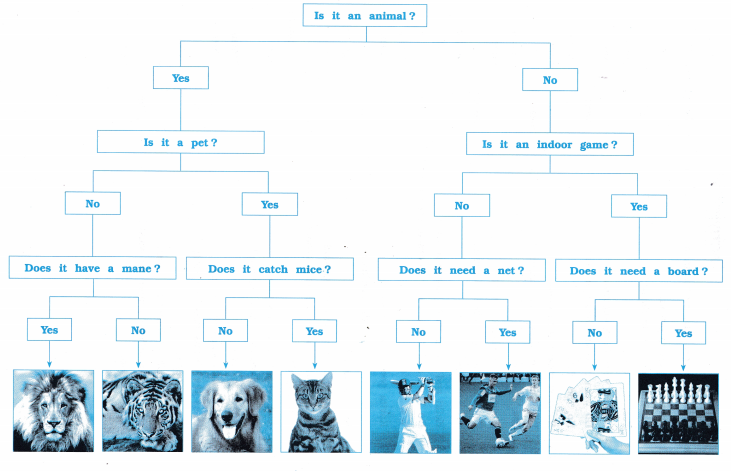
Activity 5.
Read the sentences and understand the chart. Fill in the blanks
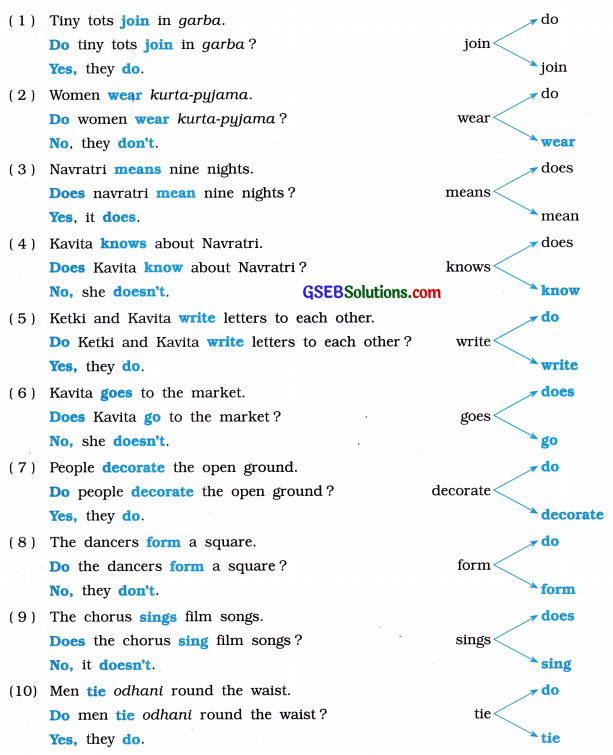
Activity 6.
Now play the game ‘MR CITY’. Your teacher will help you.
સૌપ્રથમ સમગ્ર classને બે Group માં વહેંચી દો : Group -A અને Group -B Group -Aને શિક્ષક નીચેનાં cards વહેચશે.

Group -Bને શિક્ષક નીચેનાં cards વહેચશે.

cards વહેચી લીધા બાદ શિક્ષક Group -Aના કોઈ પણ વિદ્યાર્થીને ઊભો કરીને પ્રશ્ન પૂછશે.
Example : Teacher : Where do you live ?
Group-Aનો student પોતાના cardમાં જે શબ્દ લખ્યો હશે તે વાંચીને નીચે મુજબ ઉત્તર આપશે.
Student :I live in FACE.
એટલે શિક્ષક ફરી પ્રશ્ન પૂછશે. T
eacher: Do you live in FACE ?
એટલે Group -Bમાંથી જે Student પાસે FACEનો સમાનાર્થી શબ્દ દર્શાવતું card હશે તે ઊભો થશે અને નીચે મુજબ ઉત્તર આપશે.
Student : No, he doesn’t live in FACE. He lives in SURAT.
આ રીતે એક પછી એક દરેક Card વિશે પ્રશ્ન પૂછો અને શહેર કે રાજ્યનાં નામ શોધો અને ઉત્તર મેળવો.
![]()
Activity 7.
(A) Read and arrange.
Ketki has a pen-friend in Kolkata. Her name is Kavita. Ketki wrote a letter to her friend about Navratri, a famous festival of Gujarat. But her younger brother tore the letter into pieces. Put the pieces together and find
From Ketki To Kavita
Dear Kavita,
How are you ? Are you okay now or still suffering from severe cold ? I’m going for shopping with my mother. Do you want anything from the market? I’ll buy a set of chaniya- choli for me. Navratri is round the corner, so, I’m preparing myself for it. Usually, we start the preparations a week in advance.
Do you know about the festival of Navratri Let me tell you something about it. Navratri is a major festival of Gujarat. Navratri means nine nights. Yes, it is a festival of nine nights. Everyone joins in garba. It is the folk dance of Gujarat. It continues almost throughout the night. It is a very youthful dance. Young men and women, tiny tots and elderly people – all join in garba.
The dance takes place in an open ground. People decorate and illuminate the ground with tiny bulbs. The atmosphere is like a fair. The dancers form a circle in the open ground and dance to the tune of a garba song with music.
The music is very energetic. In some places, the number of dancers is out what Ketki has written to her friend. very large, so the chorus sings garba songs from the loudspeakers. It is a tradition to sing the garba songs because a garba song worships and admires Amba Maa and other goddesses.
Nowadays, the garba song presents some social themes, too. Women and men dress up in their traditional Gujarati attire. Women wear chaniya-choli. The chaniya-choli is full of embroidery and mirror-work. They wear attractive jewellery such as bangles and bracelets, anklets and armlets, etc. Men wear kurta-pyjama and tie an odhani round the waist. Everyone moves in a circle. The dancers dance with different actions.
It is a festival of joy and friendship. You must visit Gujarat at least once during this festival. I’m sure it will be an unforgettable experience. – With Love Ketki
(B) Match A with B. Draw arrows to show the related words.
| ‘A’ | ‘B’ |
| (1) attire (2) tiny tots. (3) chorus (4) folk dance (5) jewellery (6) Goddess (7) round the corner (8) illuminated |
(a) Mahakali (b) group song (c) dress/chantya- choli (d) flighted (e) garba (f) very near (g) children (h) bracelet |
Answer:
1 – c, 2 – g, 3 – b, 4 – e, 5 – h, 6 – a, 7 – f, 8 – d
(C) Read the questions and tick mark [ ✓ ] in the Yes or No box.
| No. | Question | Yes | No |
| (1) | Do the dancers move in a circle ? | ✓ | |
| (2) | Do garba songs worship Lord Krishna? | ✓ | |
| (3) | Does Kavita sing garba songs with chorus ? | ✓ | |
| (4) | Did Ketki’s father tear the letter into pieces ? | ✓ | |
| (5) | Do old people present some social themes ? | ✓ | |
| (6) | Did Ketki buy chaniya- choli ? | ✓ | |
| (7) | Does Ketki like to play garba ? | ✓ | |
| (8) | Is Ketki from Kerala? | ✓ | |
| (9) | Do tiny tots decorate the ground with tiny bulbs ? | ✓ | |
| (10) | Do people wear traditional clothes in Navarati ? | ✓ | |
| (11) | Does Navratri last for ten days ? | ✓ |
Activity 8.
Kavita phones Ketki. But because of network problem, they cannot hear some parts of the sentences. Help them to listen to all the sentences properly.
Kavita : Hello, is it Ketki ?
Ketki: Yes, Ketki. How are you ? Did you receive my letter ?
Kavita:Yes, I received it yesterday. I am very glad to read about Navratri.
Here, in West Bengal, we too have a festival like Navratri.
Ketki: How interesting ! What it is ?
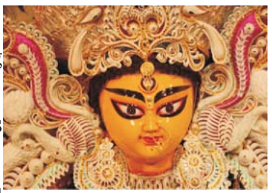
Kavita : It is Durgapuja.
Ketki: Sounds familiar. Do you also perform garba during Durgapuja ?
Kavita: No, dear. Durgapuja is like Navratri because it is related with the Mother Goddess.
Ketki: O yes, Maa Durga. Well, I called you last night. But you were not at home. Were you busy?
Kavita: Yes. I had gone for shopping with my parents. We bought new dresses, items for decoration and puja. We also purchased food items for the celebrations.
Ketki: So you wear new clothes on Durgapuja. Do you enjoy decorating for Durgapuja ?
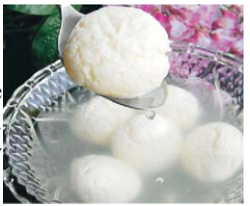
Kavita : Yes, we enjoy decorating. And we enjoy food, too. You know Bengal is famous for sweets. We eat rashogolla,sondesh, pitha, kalakand and many more sweets.
Ketki: Yes, Bengalis have sweet tooth. Do you also have festoons ?
Kavita: Yes, we do have festoons. Our puja pandals are decorative and huge. They are made of bamboo and cloth. They are temporary temples. We put huge idol of Durga in the pandal. People stand in long queue to see the Durga idol.
Ketki : Well, this sounds like Ganesh Mahotsav.
Kavita:You are quite right. India is one in many ways. ‘Bibidhata me ekta’.
Ketki: How lovely! And do you immerse the Durga idol like the Ganesh idol ?
Kavita : Yes, we also immerse the Durga idol. During the immersion procession, we chant Durga Mai ki Jai and Aashchee bochur abar hobe.
Ketki: What does that mean ?
Kavita: It means it will happen again next year.
Ketki: (laughs) Kavita, this also sounds familiar.
Kavita:Yes, dear. It affirms again that ( the Indian culture is one, from Arunachal Pradesh to Gujarat.
Ketki: Will you send me the photographs of this beautiful festival ?
Kavita : Why not ? I will send the
photographs : with Bengali sweets.
Ketki: That is very sweet of you.
Kavita : (laughs) You are welcome.
![]()
Activity 9.
Here are some questions for me, my sisters and my cow. All the questions are mixed up. Separate them in the appropriate table.
- Does it give milk every day ?
- Do you sing in the bathroom ?
- Does it eat grass ?
- Do you like Maths ?
- Does it know you ?
- Do you wake up before 7 o’clock?
- Do you play the guitar ?
- Do you like cats ?
- Do they easily get annoyed ?
- Do they go to the beauty parlour ?
- Does it sleep at night ?
- Does it love its calf?
|
I |
My Sisters |
My Cow |
| Do you sing in the bathroom | Do they easily get ahnoyed ? | Does it give milk every day? |
| Do you like Maths ? | Do they go to the beauty parlour ? | Does it eat grass ? |
| Do you wake up before o’clock ? | Does it know you ? | |
| Do you play the guitar ? | Does it sleep at night ? | |
| Do you like cats ? | Does it love its calf? |
Activity 10.
Read the paragraph.
We live a comfortable life because people work for one another. The farmer grows grains and vegetables for all. The barber cuts hair. The tailor stitches our clothes. The postman brings letters from our friends and relatives. The cobbler mends shoes. We can never forget our teachers. They teach students various subjects.
They also tell them stories and jokes. The doctor takes care of us when we are ill. We can sleep safely in our homes because the soldiers protect our borders. In this way, our life becomes easy. Ask five questions to your friend and get the answers.
Examples :
Does the barber cut our hair ?
Yes, he does.
Does the cobbler bring our letters ?
No, he doesn’t.
(1) Does the farmer grow grains and vegetables ?
Yes, he does.
(2) Does the soldier / postman stitch our clothes ?
No, he doesn’t.
(3) Does the teacher teach students ?
Yes, he does.
![]()
(4) Does the soldier take care of us when we are ill ?
No, he doesn’t.
(5) Does the soldier protect our borders ?
Yes, he does.
Activity 11.
Do you know your ‘hand hygiene score’? Put a ( ✓ ) mark In the appropriate box and count the score.
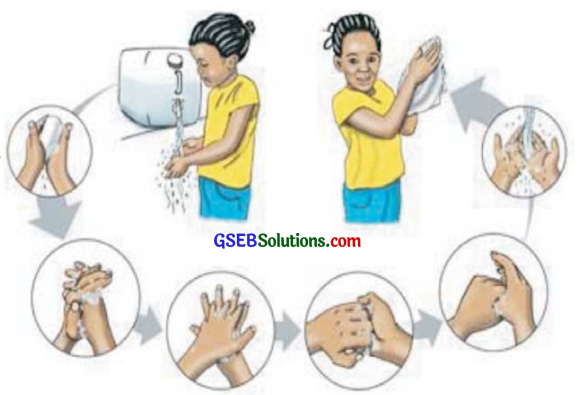
5 points for Always.
2 points for Sometimes.
0 points for Never.
| No. | Question | Always | Sometimes | Never |
| (1) | Do you wash your hands before lunch and dinner ? | ✓ | ||
| (2) | Do you wash your face, hands and legs after play? | ✓ | ||
| (3) | Do you wash your hands after touching a pet? | ✓ | ||
| (4) | Do you wash your hands after using a toilet? | ✓ | ||
| (5) | Do you wash your hands after polishing your shoes ? | ✓ | ||
| (6) | Do you wash your hands with soap ? | ✓ | ||
| (7) | Do you wash your hands for 20 seconds ? | ✓ | ||
| (8) | Do you dry your hands with a clean towel ? | ✓ | ||
| (9) | Do you wash your hands before opening the fridge ? | ✓ | ||
| (10) | Do you wash your hands after blowing your nose ? | ✓ | ||
| (11) | Do you wash your hands after you arrange your bag? | ✓ | ||
| (12) | Do you wash your hands after touching a sick person ? | ✓ | ||
| (13) | Do you wash your hands after touching a dirty place ? | ✓ | ||
| (14) | Do you rinse your hands while washing? | ✓ | ||
| (15) | Do you wash your hands after cutting nails ? | ✓ | ||
| Total | 60 | 6 | 0 | |
Let’s Learn More
1. Read the following paragraphs from the lesson.
(1) How are you (Kavita) ? Are you okay now or still suffering from severe cold ? (Ketki) am going for shopping with my mother. Do you want anything from the market? I’ll buy a set of chaniya-choli for me. Navratri is round the corner, so I’m preparing myself for it. Usually, we start the preparations a week in advance.
Answer the following questions.
Question 1.
Where is Ketki going? Why?
Answer:
Ketki is going to the market for shopping.
Question 2.
What will Ketki buy ?
Answer:
Ketki will buy a set of chaniya-choli.
Question 3.
What is Ketki preparing for ?
Answer:
Ketki is preparing for Navratri.
![]()
Question 4.
Does Ketki have a cold ?
Answer:
No, Ketki doesn’t have a cold.
Answer the questions selecting the correct options.
Question 1.
Kavita is suffering from ……………
A. stomach-ache
B. fever
C. a severe cold
D. tooth-ache
Answer:
C. a severe cold
Question 2.
Navratri preparation start in advance.
A. 45 days
B. 30 days
C. 15 days
D. 7 days
Answer:
D. 7 days
Question 3.
Ketki is preparing for
A. Diwali
B. Navratri
C. Holi
D. Janmashtami
Answer:
B. Navratri
Question 4.
Ketki will buy
A. jewellery
B. clothes
C. chantya-choli
D. shoes
Answer:
C. chantya-choli
Question 5.
Which word in the passage means ‘very much’ ?
A. severe
B. usually
C. suffering
D. advance
Answer:
C. suffering
Question 6.
‘Round the corner’ means …
A. at the corner
B. very near
C. very far
D. at the circle
Answer:
B. very near
![]()
(2) Navratri is a major festival of Gujarat. ‘ Navratri means nine nights. Yes, it is a festival of nine nights. Everyone joins in garba. It is the folk dance of Gujarat. It continues almost throughout the night. It is a very youthful dance. Young men and women, tiny tots and elderly people-all join in garba.
Answer the following questions.
Question 1.
Which is a major festival of Gujarat?
Answer:
Navratri is a major festival of Gujarat.
Question 2.
What does Navratri mean ?
Answer:
Navratri means nine nights.
Question 3.
Which is the folk dance of Gujarat ?
Answer:
Garba is the folk dance of Gujarat.
Question 4.
Who join in the garba ?
Answer:
Young men and women, tiny tots and elderly people join in the garba.
Answer the questions selecting the correct options.
Question 1.
Garba is a ………… dance.
A. elderly
B. slow
C. youthful
D. lazy
Answer:
C. youthful
Question 2.
Navratri means
A. nine nights
B. ten nights
C. eight nights
D. new moon nights
Answer:
A. nine nights
Question 3.
………….. is the folk dance of Gujarat.
A. Bhangra
B. Lavni
C. Garba
D. Tipni
Answer:
C. Garba
![]()
Question 4.
Which word in the passage means ‘very big’ ?
A. folk
B. youthful
C. festival
D. major
Answer:
D. major
(3) The dance takes place in an open ground. People decorate and illuminate the ground with tiny bulbs. The atmosphere is like a fair. The dancers form a circle in the open ground and dance to the tune of a garba song with music. The music is very energetic.
In some places, the number of dancers is very large, so the chorus sings garba songs from the loudspeakers. It is a tradition to sing the garba songs because a garba song worships and admires Amba Maa and other goddesses. Nowadays, the garba song presents some social themes, too.
Answer the following questions.
Question 1.
Where does the dance take place ?
Answer:
The dance takes place in an open ground.
Question 2.
What do the dancers do ?
Answer:
The dancers form a circle and dance to the tune of a garba song with music.
Question 3.
Question What happens when the number of dancers is very large ?
Answer:
When the number of dancers is very large, a chorus sings garba songs from the loudspeakers.
Question 4.
Why do we sing garba songs ?
Answer:
We sing garba songs because a garba song worships and admires Amba Maa and other goddesses.
Question 5.
What does the garba song present nowadays ?
Answer:
Nowadays, the garba song presents some social themes.
Question 6.
How do the people prepare the dance ground ?
Answer:
People decorate and illuminate the dance ground with tiny bulbs.
![]()
Answer the questions selecting the correct options.
Question 1.
People illuminate the ground with
A. flowers
B. tiny bulbs
C. lamps
D. festoons
Answer:
B. tiny bulbs
Question 2.
The atmosphere is like a
A. circus
B. exhibition
C. show
D. fair
Answer:
D. fair
Question 3.
Which word in the passage means ‘to light up’ ?
A. decorate
B. chorus
C. energetic
D. illuminate
Answer:
D. illuminate
Question 4.
The garba music is very
A. slow
B. fast
C. energetic
D. lazy
Answer:
C. energetic
Question 5.
‘Chorus’ means
A. a group of singers
B. a group of dancers
C. a groups of students
D. a group of people
Answer:
A. a group of singers
Question 6.
A garba song worships
A. Amba
B. Krishna
C. Shiv
D. all gods
Answer:
A. Amba
Question 7.
Nowadays, the garba song presents
A. cultural themes
B. social themes
C. educative themes
D. movie themes
Answer:
B. social themes
![]()
(4) Women and men dress up in their traditional Gujarati attire. Women wear chaniya-choli. The chaniya-choli is full of embroidery and mirror-work. They wear attractive jewellery such as bangles and bracelets, anklets and armlets, etc. Men wear kurta-pyjama and tie an odhani round the waist. Everyone moves in a circle. The dancers dance with different actions.
Answer the following questions.
Question 1.
What do the women wear ?
Answer:
Women wear chaniya-choli.
Question 2.
What do the men wear ?
Answer:
Men wear kurta-pyjama and tie an odhani round the waist.
Question 3.
Which jewellery do the women wear ?
Answer:
Women wear jewellery such as bangles and bracelets, anklets and armlets.
Answer the questions selecting the correct options.
Question 1.
Men and women wear ………….. Gujarati attire.
A. new
B. old
C. traditional
D. modern
Answer:
C. traditional
Question 2.
The chaniyafCholi is full of
A. embroidery and mirror-work
B. zari
C. lace
D. paintings
Answer:
A. embroidery and mirror-work
Question 3.
Which word in the passage means ‘eye-catching’ ?
A. attire
B. different
C. traditional
D. attractive
Answer:
D. attractive
![]()
Question 4.
The dancers dance with different
A. dresses
B. actions
C. groups
D. moves
Answer:
B. actions
(5) It is a festival of joy and friendship. You must visit Gujarat at least once during this festival. I’m sure it will be an unforgettable experience.
Answer the questions selecting the correct options.
Question 1.
Navratri is a festival of ………
A. joy and fun
B. joy and friendship
C. fun and friendship
D. fun and dance
Answer:
B. joy and friendship
Question 2.
It will be ……….. experience.
A. a new
B. a good
C. an inspiring
D. an unforgettable
Answer:
D. an unforgettable
2. Write the answers with ‘Yes’ and ‘No’.
Example : Does Mohan run fast ?
Yes, he runs fast.
No, he doesn’t run fast.
(1) Do we go home early?
Yes, we go home early.
No, we don’t go home early.
(2) Does Rajan read English ?
Yes, he reads English.
No, he doesn’t read English.
(3) Does Mira write a poem ?
Yes, she writes a poem.
No, she doesn’t write a poem.
(4) Do the postmen come daily ?
Yes, they come daily.
No, they don’t come daily.
(5 ) Does Mr Joshi teach you Maths ?
Yes, he teaches us Maths.
No, he doesn’t teach us Maths.
(6) Do they cook food ?
Yes, they cook food.
No, they don’t cook food.
![]()
(7) Does Ali come to the shop ?
Yes, he comes to the shop.
No, he doesn’t come to the shop.
(8) Does Geeta paint pictures ?
Yes, she paints pictures.
No, she doesn’t paint pictures.
3. Form questions and write answers with ‘Yes’ and ‘No’, Example: The children play tennis.
Do the children play tennis?
Yes, they do.
No, they don’t.
(1) Tarak visits his uncle, Does Tarak visit his uncle ?
Yes, he does.
No, he doesn’t.
(2) They walk in the garden.
Do they walk in the garden?
Yes, they do.
No, they don’t.
(3) Sanjay catches the ball.
Does Sanjay catch the ball?
Yes, he does.
No, he doesn’t
(4) The boy rings the bell.
Does the boy ring the bell ?
Yes, he does.
No, he doesn’t.
(5) We learn Sanskrit.
Do we learn Sanskrit?
Yes, we do.
No, we don’t.
(6) Jay and Raj collect marbles.
Do Jay and Raj collect marbles ?
Yes, they do.
No, they don’t
(7) Nisha makes tea.
Does Nisha make tea ?
Yes, she does.
No, she doesn’t.
(8) Mrs Pandya buys vegetables.
Does Mrs Pandya buy vegetables?
Yes, she does.
No, she doesn’t.
4. Write the answers with ‘Yes’ and ‘No’.
Example : Did Mona eat an apple ?
Yes, she ate an apple.
No, she didn’t eat an apple.
(1) Did Darshan drink tea?
Yes, he drank tea.
No, he didn’t drink tea.
(2) Did the children finish their homework ?
Yes, they finished their homework.
No, they didn’t finish their homework.
(3) Did Ramu water the plants ?
Yes, he watered the plants.
No, he didn’t water the plants.
(4) Did Bharat throw the ball ?
Yes, he threw the ball.
No, he didn’t throw the ball.
(5) Did Sonal draw a rangoli ?
Yes, she drew a rangoli.
No, she didn’t draw a rangoli.
![]()
(6) Did Mehul sing a song ?
Yes, he sang a song.
No, he didn’t sing a song.
(7) Did we learn grammar ?
Yes, we learnt grammar.
No, we didn’t learn grammar.
(8) Did Vidya buy a dress ?
Yes, she bought a dress.
No, she didn’t buy a dress.
5. Form questions and write answers with ‘Yes’ and ‘No’.
Example : Manan played chess.
Did Manan play chess?
Yes, he did.
No, he didn’t.
(1) Rekha wrote, a letter.
Did Rekha write a letter ?
Yes, she did.
No, she didn’t.
(2) They studied in the evening.
Did they study in the evening?
Yes, they did.
No, they didn’t.
(3) We played chess.
Did we play chess?
Yes, we did.
No, we didn’t.
(4) Arjun went to Surat.
Did Arjun go to Surat?
Yes, he did.
No, he didn’t.
(5) Kamal came for the party.
Did Kamal come for the party?
Yes, he did.
No, he didn’t.
(6) The postman brought a letter.
Did the postman bring a letter ?
Yes, he did.
No, he didn’t.
(7) Uma and Sonal sang a song.
Did Uma and Sonal sing a song?
Yes, they did.
No, they didn’t.
(8) Mohan made tea for us.
Did Mohan make tea for us ?
Yes, he did.
No, he didn’t.
![]()
6. Write the answers with ‘Yes’ and ‘No’.
Example : Will Pooja come with us ?
Yes, she will come with us.
No, she won’t come with us.
(1) Will the teacher punish Yatin ?
Yes, she will punish Yatin.
No, she won’t punish Yatin.
(2) Will we reach on time ?
Yes, we will reach on time.
No, we won’t reach on time.
(3) Will the boys fly kites ?
Yes, they will fly kites.
No, they won’t fly kites.
(4) Will Hetal draw a rangoli ?
Yes, she will draw a rangoli.
No, she won’t draw a rangoli.
(5) Will Jatin colour the picture ?
Yes, he will colour the picture.
No, he won’t colour the picture.
(6) Will the farmers sow seeds ?
Yes, they will sow seeds.
No, they won’t sow seeds.
(7) Will the policemen catch the thief ?
Yes, they will catch the thief.
No, they won’t catch the thief.
(8) Will Tejal sing a song ?
Yes, she will sing a song.
No, she won’t sing a song.
7. Form questions and write answers with ‘Yes’ and ‘No’.
Example: They will buy this house.
Will they buy this house?
Yes, they will.
No, they won’t.
(1) Akash will tell a story.
Will Akash tell a story?
Yes,he will.
No, he won’t.
(2) Grandfather will go for a walk.
Will grandfather go for a walk?
Yes, he will.
No, he won’t.
(3) The principal will visit the classrooms.
Will the principal visit the classrooms?
Yes, he will.
No, he won’t.
(4) Divya will decorate the room.
Will Divya decorate the room?
Yes, she will.
No, she won’t.
(5) The boys will paint the walls.
Will the boys paint the walls ?
Yes, they will.
No, they won’t.
![]()
(6) They will clean the garden.
Will they clean the garden ?
Yes, they will.
No, they won’t.
(7) We will go for a picnic.
Will we go for a picnic?
Yes, we will.
No, we won’t
(8) Payal will call her friends.
Yes, she will.
No, she won’t.
Word Meanings.
